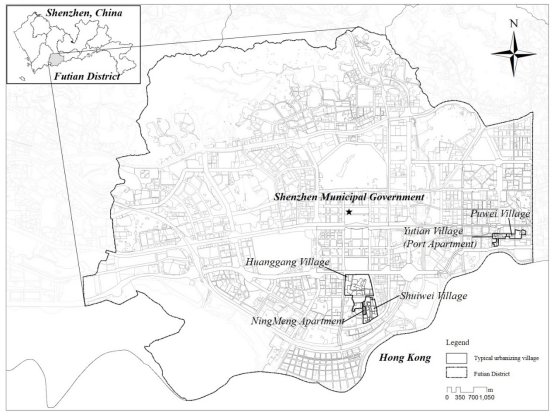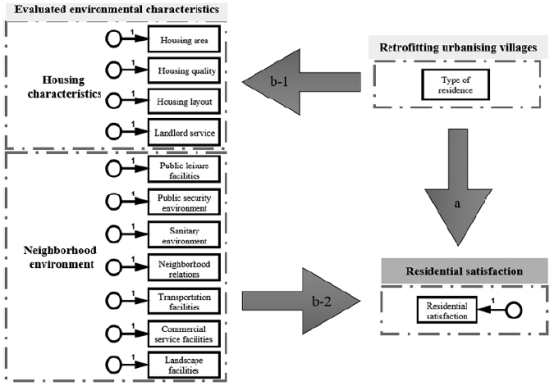Recently, Researcher Tong De from Peking University Shenzhen Graduate School, in collaboration with Associate Professor Gong Yue from the School of Urban Design at Wuhan University, published a research paper titled “Retrofitting urbanising villages and tenants’ residential satisfaction: a case study of Shenzhen, China” in the internationally renowned housing studies journal Housing Studies. The study evaluates the policy effectiveness and optimization pathways of urbanizing village retrofitting in Shenzhen from the perspective of tenant satisfaction. It proposes cost-efficient, incremental renewal strategies—such as collective action-driven centralized retrofitting and sustained improvements to neighborhood environments and indoor living quality—offering a theoretical and policy framework for informal space governance that transcends the traditional “government-developer-landowner” coordination model while balancing efficiency and equity.
Publication Details:Zhiqiang Cao, De Tong*, Yue Gong* & Chunxia Gu. (2025). Retrofitting urbanising villages and tenants’ residential satisfaction: a case study of Shenzhen, China. Housing Studies, 1–27.
https://doi.org/10.1080/02673037.2024.2445802

Introduction
Since the 1970s, community-led inclusive slum governance has emerged as a strategy for informal housing management in the Global South, emphasizing multi-stakeholder participation, respect for existing conditions, and public service improvements. However, many projects fail to sustainably benefit vulnerable groups due to inadequate oversight of public facilities and uneven distribution of benefits.
In China, urbanizing villages (chengzhongcun) represent the primary form of informal housing. Shenzhen has pioneered a retrofitting strategy that incrementally upgrades building and neighborhood quality without altering original layouts. Existing studies on such retrofitting remain nascent, focusing on implementation processes, stakeholder interests, and mechanisms, with limited attention to outcomes—particularly for tenants, the dominant residents. This study addresses this gap by analyzing how retrofitting impacts tenant satisfaction, enriching global research on informal housing governance and advocating for prioritizing social function over aesthetics in spatial interventions.
Research Design
The study examines four urbanizing villages in Futian District, Shenzhen, with similar built environments:
Shuiwei Village and Yutian Village: Early adopters of centralized and decentralized retrofitting models, respectively.
Huanggang Village and Puweixincun: Unretrofitted comparative cases.
Ningmeng Apartments (Shuiwei) and Poyu Apartments (Yutian): Representative projects of centralized and decentralized models.

Figure 1: Case Study Locations
Data Collection:
Field surveys conducted between July and October 2019 included semi-structured interviews with village leaders and landlords, alongside randomized tenant questionnaires (595 valid responses: Shuiwei, 199; Yutian, 199; Huanggang, 99; Puweixincun, 98).
Methodology:

Figure 2: Theoretical Framework
Findings and Policy Implications
Retrofitting Outcomes: Unlike global practices prioritizing neighborhood upgrades, Shenzhen’s retrofitting improves both housing features and neighborhood environments. However, tenant satisfaction gains primarily stem from housing upgrades, with limited neighborhood effects due to prevalent decentralized retrofitting.
Centralized vs. Decentralized Retrofitting:
Centralized models (e.g., Shuiwei) enhance satisfaction by upgrading housing quality and neighborhood amenities (e.g., public leisure/landscape facilities).
Decentralized models (e.g., Yutian) yield fragmented improvements, underscoring the need for collective action to unify stakeholders.
Priority Improvements:
Role of Collective Action:
Village collectives bridge gaps in formal governance by mobilizing social, cultural, and material capital. Centralized retrofitting demands consensus-building among landowners, enabling developers to negotiate efficiently with collectives rather than individual owners.
Recommendations:
Promote centralized retrofitting supported by collective action.
Sustain upgrades to housing and neighborhood environments.
Shift governance focus from physical upgrades to resident-centric metrics (e.g., satisfaction, equity).
Expand empirical research on informal settlements to guide resource allocation toward high-impact features (e.g., housing quality over superficial amenities).
Global Relevance
This study provides theoretical and empirical support for informal space governance in the Global South. Adaptive, satisfaction-oriented strategies that ensure multi-stakeholder participation—particularly for vulnerable groups—embody high-quality development and equitable governance.
Graphics: Zhiqiang Cao, Tong De
Review: Tong De